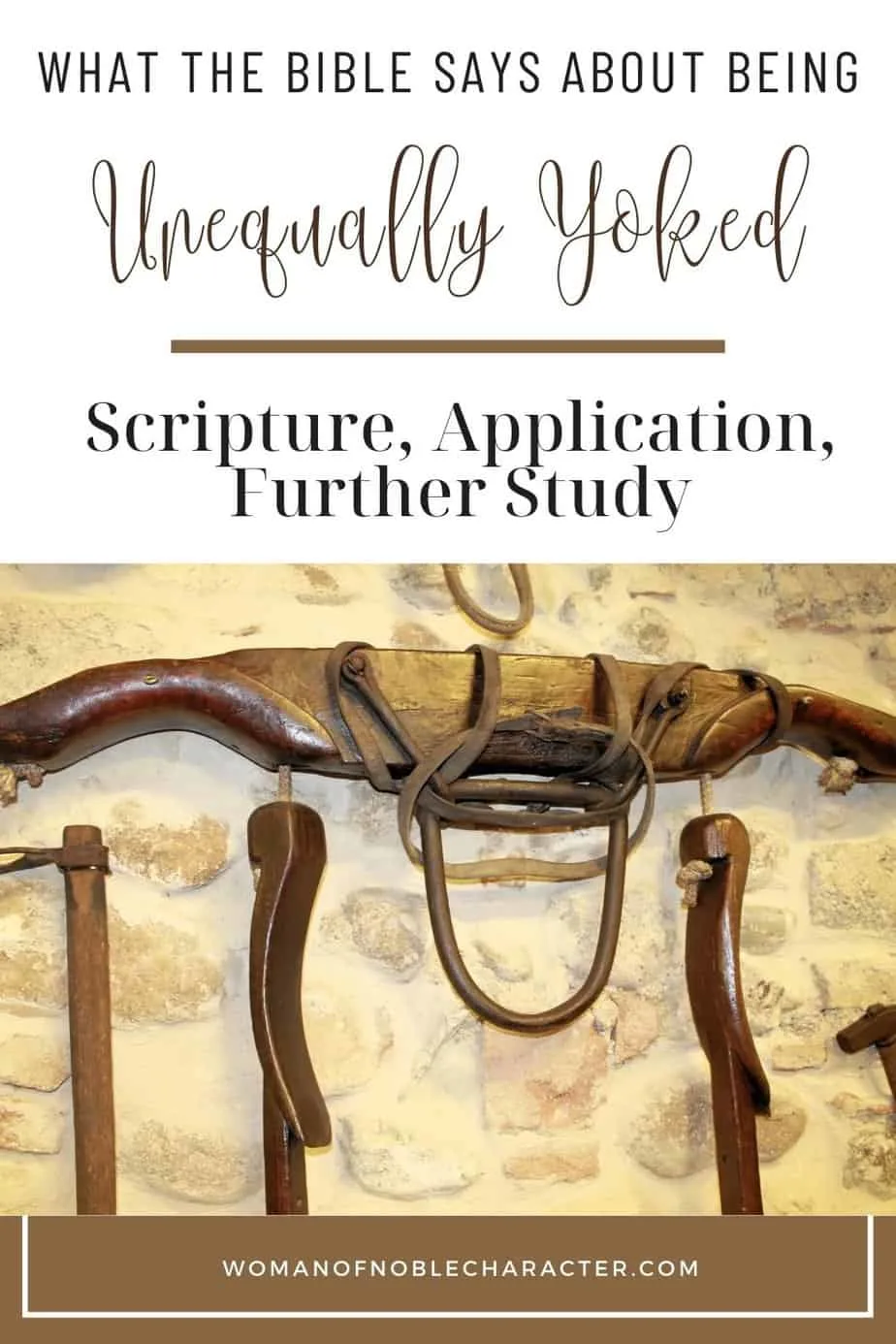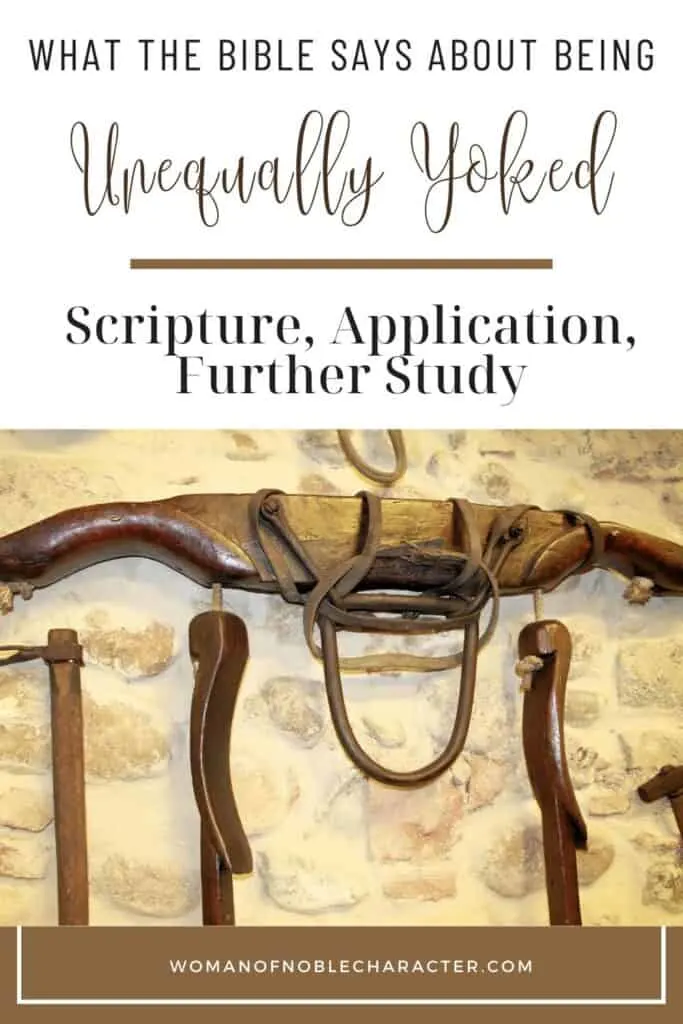This page/post may contain affiliate links. As an Amazon Associate, as well as an affiliate of other programs, this means if you purchase something using these links, I will receive a commission on qualifying purchases at no cost to you! For more detailed information, please visit our Affiliate Disclaimer page
Unequally yoked. We hear of it in church and probably read about it online or in Bible Studies, but what does it mean? Before we look at the verse from which this phrase comes, let’s first look at the phrase itself.
I loved this simple explanation from Got Questions.org: A yoke is a wooden bar that joins two oxen to each other and to the burden they pull. An “unequally yoked” team has one stronger ox and one weaker, or one taller and one shorter.
The weaker or shorter ox would walk more slowly than the taller, stronger one, causing the load to go around in circles. When oxen are unequally yoked, they cannot perform the task set before them. Instead of working together, they are at odds with one another.

So, what does that have to do with biblically being unequally yoked? There are many unequally yoked Bible verses, but let’s examine just a few.
Do not be unequally yoked with unbelievers. For what partnership has righteousness with lawlessness? Or what fellowship has light with darkness?
2 Corinthians 6:14 (ESV)
Be ye not unequally yoked together with unbelievers: for what fellowship hath righteousness with unrighteousness? and what communion hath light with darkness?
2 Corinthians 6:14
A yoke or zugos is “a heavy burden, comparable to the heavy yokes resting on the ox’s necks; in a way, a balance or pair of scales. The Greek used in 2 Corinthians 6:14 is heterozugeó means “unequally yoked.”
Christ’s word zugos is found in Matthew 11:28-30, where he invites those listening to:
Come to me, all who labor and are heavy laden, and I will give you rest. Take my yoke upon you, and learn from me, for I am gentle and lowly in heart, and you will find rest for your souls. For my yoke is easy, and my burden is light.”
Matthew 11:28-30 (ESV)
When one is “yoked” to a partner, two people should equally share the burdens of life and the purpose of their calling in Christ to glorify God. Their work will be light even though there will still be toil because they will be striving to go in the same direction, joyfully burdened for Christ. Their burden will be light because their equal yoke will bring peace and rest.
Paul’s counsel to the church of Corinth in 2 Corinthians 6:14 is part of a larger conversation with the church of the Christian life. He discouraged them from being in unequally yoked partnerships and relationships with unbelievers because believers and unbelievers are very different. They are opposites, just as light and darkness are opposites. They have nothing in common, just as Christ has nothing in common with “Belial,” a Hebrew word meaning “worthlessness” in verse 15 below.
What accord has Christ with Belial? Or what portion does a believer share with an unbeliever?
2 Corinthians 6:15 (ESV)
Here Paul uses the word Belial to refer to Satan. In this way, he illustrates that Satan’s principles direct the pagan, wicked, and unbelieving world and that Christians should keep themselves separate from that evil world, just as Christ was separate from all the schemes, ideas, ideals, and plans of Satan.
We should not try to live a Christian life with non-Christians for our close friends and allies. It will only cause us to go around in circles.
The “unequal yoke” is also often applied to business relationships. Entering into a business partnership with an unbeliever is very dangerous. Theirs are opposite values, morals, and worldviews, so that any decisions will reflect one partner’s or the other person’s perspective.
When a businessperson abandons his moral center for profit, it can have detrimental effects on both themselves and others. More often than not, in these cases where someone leaves their Christian principles behind to grow an organization more quickly-they find themselves pressured by those around them who seek only selfish gains at any cost, including sin.
Unequally Yoked Marriage
Arguably, the most popular interpretation of this verse is that it centers on marriage. However, John Calvin correctly refutes this interpretation, saying, “Many are of opinion that he [Paul] speaks of marriage, but the context clearly shows that they are mistaken.” Calvin continues, “When, therefore, he prohibits us from having partnership with unbelievers in drawing the same yoke, he means simply this, that we should have no fellowship with them in their pollution.”
The scholar summarizes his view, saying that “to be yoked with unbelievers mean nothing less than to have fellowship with the unfruitful works of darkness, and to hold out the hand to them in token of agreement.”
While I agree that Paul’s primary application of 2 Corinthians 6:14 does not strictly pertain to marriages, we should not interpret it as simply admonishing other relationships, including business, friendship, and others.
Instead, we should recognize Paul’s instruction as a repudiation of engaging in idolatrous and ungodly living and worship contrary to the gospel of Jesus Christ and avoid any relationships that would encourage such evil.
Of course, the closest relationship one person can have with another is marriage, which is how the passage is usually interpreted. God’s plan is for a man and a woman to become “one flesh” (Genesis 2:24), a relationship so intimate that one literally and figuratively becomes part of the other. Uniting a believer with an unbeliever is essentially uniting opposites, which makes for a complicated marriage relationship.
Unbelievers tend to have different worldviews than those of believers. Those views include things on sin (premarital sex, morals, values, etc.) While I don’t believe it is a sin to marry an unbeliever, it would be unhealthy for the marriage and the believer’s faith in the long run.
Let’s look at a few issues that may come up when a believer marries an unbeliever:
Children – how would they be raised? To believe that Jesus was the son of God? Would that result in confusion that one parent believes that and the other doesn’t?
Tithing – how would the unbeliever react to the believer giving the first 10% of their earnings to God? Would they resent it? Find it silly? What problems could arise?
Church attendance and ministry involvement – would the unbeliever resent the amount of time that the other is spending at church or in ministry? What issues could this situation present?
Social Life – while this may not be true for all, the unbelieving spouse may want to do things socially that are out of alignment with the believer’s values. Things that may involve immorality, excessive drinking, drugs, or other activities. Not necessarily illegal, but uncomfortable for the believer.
Those are just a few. But wait, doesn’t the Bible say that unbelieving spouses are made holy through the believing spouse?
For the unbelieving husband is made holy because of his wife, and the unbelieving wife is made holy because of her husband. Otherwise your children would be unclean, but as it is, they are holy.
1 Corinthians 7:14 (ESV)

Well, not exactly. The Gospel Coalition explains it this way: That the unbelieving husband “is made holy” does not say that he enjoys salvation vicariously through the believing wife, but rather that proximity to his wife’s Christ-centered living creates opportunities for godly influence. Each time a wife models godliness (1 Peter 3:1-6) to her husband, that’s another moment he’s not being influenced by the godlessness that desires to lay claim to his soul.
In this way, he “is made holy” because he is set apart from the world and more likely to receive the gospel. Similarly, because of the decision to remain intact as a family, children of the marriage have a greater opportunity for exposure to the influence of biblical truth.
When two people are unequally yoked together, there is no way for them to live in harmony. One person will be pulling while the other pushes because of their uneven partnership, and life becomes complicated with constant conflict over which direction things should go. There can be no peace and no rest for either.
The plow cannot go straight, which means the work is hard, and the yoke is heavy.
Paul’s contrasts of light and dark evoke the painful division potentially inherent to a marriage like this.
Another negative consequence of an unequally yoked marriage is the potential for the Christian spouse to abandon their faith under pressure from the other party. God addressed the issue of intermarriage when he gave his people the Ten Commandments and other rules they were to follow to live righteously and peacefully with one another and with God.
More about an Unequally Yoked Marriage
In Deuteronomy 7, we find Moses instructing the Israelites about their responsibilities as the people of God. They have been freed from slavery and are now free people, about to enter the Promised Land. But Moses gives them a warning:
“You shall not intermarry with them, giving your daughters to their sons or taking their daughters for your sons, for they would turn away your sons from following me to serve other gods. Then the anger of the Lord would be kindled against you, and he would destroy you quickly”.
Deuteronomy 7:3-4 (ESV)
Several hundred years later, Israel is in direct rebellion against God’s command:
“So the people of Israel lived among the Canaanites, the Hittites, the Amorites, the Perizzites, the Hivites, and the Jebusites. And their daughters they took to themselves for wives, and their own daughters they gave to their sons, and they served their gods”.
Judges 3:5-6 (ESV)
For some reason, the Israelites chose to ignore this command from God. They may have rationalized it due to a lack of women or safety alliances. Still, the Israelites began to form covenants between themselves and people who either didn’t know God or worshipped other “gods.” By doing so, they were led astray.
Throughout Scripture, we see this issue repeated. First, Samson, who repeatedly sought out unbelieving women, a choice which in the end destroyed him (Judges 14), and then Solomon, called the wisest man in the world – until his multiple wives led him to worship other gods (1 Kings 11).
Direct disobedience occurs when we join with people who do not love or follow Christ.
We must not be in a harmonious, God-pleasing relationship with an unbeliever because there is no fellowship between light and darkness.
God knows this; He designed this. It’s why he commanded the Israelites to marry only other Israelites, and He inspired Paul to issue the same command.
This is for our spiritual protection! Righteousness has nothing in common with someone who believes they are good enough on their own apart from God.
No relationship apart from Christ can be indeed “good” No “love” apart from Christ is true love. A relationship may seem good or filled with love from the outside but will never be aligned within.
And Jesus said to him, “Why do you call me good? No one is good except God alone.
Mark 10:18 (ESV)
So we have come to know and to believe the love that God has for us. God is love, and whoever abides in love abides in God, and God abides in him. By this is love perfected with us, so that we may have confidence for the day of judgment, because as he is so also are we in this world.
1 John 4:16-17 (ESV)
Potential Positive Outcomes of an Unequally Yoked Marriage
It is possible that a believing spouse could influence their partner to consider the gospel.
Where one spouse was converted when they were already together, he said the two who are unequally yoked should stay together for “the unbelieving husband is made holy because of his wife, and the unbelieving wife is made holy because of her husband” (1 Corinthians 7:14).
There is a chance that a believing wife who models godly living in front of her husband (or vice versa) could win him over for the Lord. Or, more accurately, God would win over the unbelieving spouse and invite them to participate in his saving work.
God’s love for you does not change; He is the one who redeems, whether He redeems and resurrects your spouse’s heart or you find your passion and need for God growing more robust because of the difficulty you face. Trust Him to bring about renewal, and trust that the form renewal takes will glorify him and be good for you, even if your spouse never gives his heart to Jesus.
My Story of an Unequally Yoked Marriage
I married my high school sweetheart at age 22. We were raised Catholic (he even went to Catholic school from K-9). We made all the sacraments (baptism, communion, etc.), but neither of us had a relationship with Christ.
About ten years into our marriage, I found Christ and gave my life to Him. We began to live very different lives. I began to watch my word so as not to denigrate the Lord. I took my sons to church. I read the Bible to them every day. We prayed before meals and at bedtime. I was no longer interested in partying or other entertainment that we had both enjoyed together. I was filled with the Holy Spirit.
Unfortunately, my husband did not like this change in me. When he left my sons and me, he cited that I was now a “Jesus Freak.”
When I spoke to our priest and sought the counsel of godly friends, they talked with me about being unequally yoked. I was advised to model godly living and pray for him to be saved.
Sadly, it wasn’t enough. I was devasted as I knew that God despises divorce.
Years later, I met the man whom I later married. One who loved the Lord prayed and attended church with me. One who did daily couple’s devotions with me. God had a better plan, and my unequally yoke marriage was part of that plan. I had to go through what I did to see the good in my second husband. To see what being married to a believer meant and how many disconnects in my prior marriage shined a light on what it meant to be unequally yoked.
So what do you do if you are married to an unbeliever? The most important two things are 1) Pray for their salvation and 2) Model Christian behavior. God is working on turning your spouse’s heart and will use you and your actions to do so. This is not to say that you have failed God if your spouse doesn’t believe. You cannot force someone to love Jesus, but you can show them what God’s love looks like through your words and actions.
Are you, or were you married to an unequally yoked spouse? What struggles did you or do you face?
You may enjoy this video about being unequally yoked.
Jesus and His Yoke
To wrap up, I want to remind you that the yoke (as well as all of scripture) should point our hearts and minds to Jesus. The “yoke” calls us to remember the one who pronounced,
Come to me, all who labor and are heavy laden, and I will give you rest. Take my yoke upon you, and learn from me, for I am gentle and lowly in heart, and you will find rest for your souls. For my yoke is easy, and my burden is light.”
Matthew 11:28-30 (ESV)
I pray that we are not yoked to idols but Jesus Christ.
For deeper reading on this subject, here are some great resources:
Unequally Yoked: Staying Committed to Jesus and Your Unbelieving Spouse by Miranda J. Chivers
The Helpmate: Unequally Yoked by T.M. Leathers
I’m praying for you, my friend.
In Him,
Sue
ESV – “Scripture quotations are from The ESV® Bible (The Holy Bible, English Standard Version®), copyright © 2001 by Crossway, a publishing ministry of Good News Publishers. Used by permission. All rights reserved.”
For a look at the Proverbs 31 wife, see this prior post HERE.

